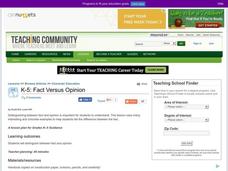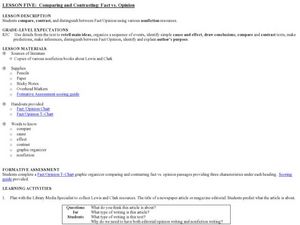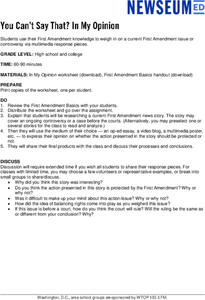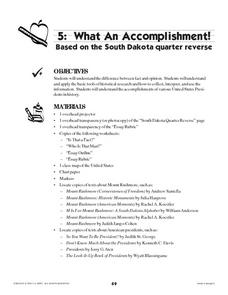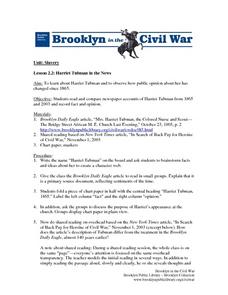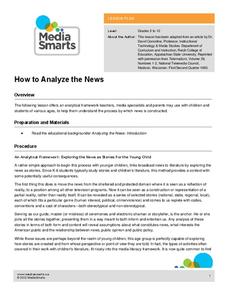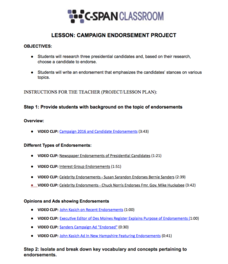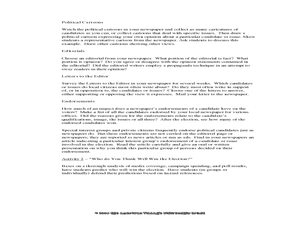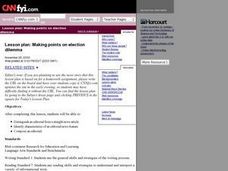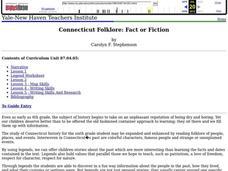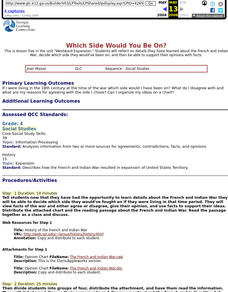Curated OER
Fact Versus Opinion
Students differentiate between fact and opinion. They define fact and opinion, then listen to and identify examples of each. Students identify different books where facts and opinions can be found, and cut out newspaper and magazine...
Curated OER
Comparing and Contrasting: Fact vs. Opinion
Elementary schoolers investigate nonfiction stories by analyzing facts and opinions. They read nonfiction stories about the Lewis and Clark expedition. Pupils utilize a T-chart to list the facts and opinions on opposite sides, and then...
Curated OER
Martin Luther King Jr.: A Fact Or Opinion Activity
Students discuss the difference between fact and opinion, then read a brief biography of Martin Luther King Jr. They complete the Martin Luther King Jr.: Fact or Opinion worksheet.
Curated OER
School Newspaper
Fifth graders run a school newspaper on a school website and discover how to use various literary forms as they relate to the writing process. For this school newspaper lesson, 5th graders synthesize information from different sources,...
Newseum
Weighing the Arguments
To understand how personal perspectives can affect policy and politics, scholars examine the woman suffrage media map and historical artifacts to analyze arguments for and against women's suffrage. Class members then take on the role of...
Curated OER
Understanding and Using Primary and Secondary Sources in History
Explore primary and secondary sources in this historical analysis lesson. Young researchers define the terms primary source and secondary source. They read a primary source document provided by the teacher and answer questions about the...
Newseum
You Can’t Say That: In My Opinion
As a part of a study of the First Amendment, high schoolers research a current news story that seems to involve one of the freedoms granted by the First Amendment. Investigators decide whether they think the action presented in the story...
Curated OER
What an Accomplishment
Students identify and discuss the images on the back of the South Dakota quarter. They discuss the differences between facts and opinions, and research information about the four presidents memorialized on Mount Rushmore.
Curated OER
The Vikings
Young scholars research and explore Viking culture, distinguishing between fact and fiction, and examine their contribution to our society.
Curated OER
Electrifying Franklin
Fourth graders research and present information about Benjamin Franklin's life and accomplishments. In this lesson on Benjamin Franklin, 4th graders review idioms and sayings written by Franklin then compare and contrast his various...
Newseum
Fake News Through History: Analyzing Historical Sources
Unfortunately, fake news, fuzzy facts, and bogus news stories are not new phenomena. Class members use a "Fake News Through History" worksheet to analyze historical examples of false, invented, made-up news. Researchers share their...
Curated OER
Harriet Tubman In The News
High schoolers investigate the history of Harriet Tubman. They use newspaper articles from history and modern times in order to gather information. They use a graphic organizer in order to categorize information. They distinguish the...
Media Smarts
How to Analyze the News
Teach kids how to watch television, specifically the news, with this creative idea for learners of all ages from the Media Awareness Network. The elementary school plan focuses on presenting news as a story and uses Jon Scieszka's story...
C-SPAN
Campaign Endorsement Project
So many politicians, so many endorsements! Learn to differentiate between facts as well as the process of endorsements with an informative resource. Class members watch current endorsement videos, research candidates from three different...
Curated OER
The Campaign: Issues and Strategies. What do you think?
Students research a candidate in an election and discuss how the media portrays that candidate and how the media influences voters. In this candidate lesson plan, students also distinguish fact from opinion, look at political cartoons,...
Curated OER
Pioneering Children on the Move
Students inquire about life for pioneer children. In this pioneer period lesson plan, students analyze photographs of children, make information foldables, and create a covered wagon that was typical of the ones of the past. Students...
Curated OER
Whose Neighborhood is It? Whose America is This?
Learners use electronic resources to study immigration issues, analyze immigration issues dealing with security, economics, lawfulness, culture, and human rights, and discuss possible solutions. Students then express their opinions by...
Curated OER
Good News/Bad News/Who Cares?
Young scholars practice evaluating facts, bringing to bear their own experience, preferences, and international contexts. They recognize that there are many ways of interpreting a single piece of information and form the habit of...
Curated OER
Making Points on Election Dilemma
Students define a straight news article, and identify characteristics of an editorial news feature. They read a CNN article that examines the 2000 presidential election, and determine what is factual and what is opinion.
Curated OER
Connecticut Folklore: Fact or Fiction
Sixth graders read legends to learn the history of Connecticut in a fun informative way.
Curated OER
Which Side Would You Be On?
Fourth graders describe how the French and Indian War resulted in expansion of United States Territory and analyze information from two or more sources for agreements, contradictions, facts, and opinions.
C-SPAN
Make a “Deliberations” Site
Many hot button issues require deliberations, even in your classroom! Learners work in teams or as individuals to decide on a deliberation question to make into a Google site. They research the topics in depth, discuss both sides of the...
Curated OER
Robinson vs Barlow and the White Indians: A Trial
Pupils judge the actions of Nathan Barlow and the White Indians by putting them on trial in the classroom. They discuss how public opinion can change based on time. Students judge the White Indians based on the early 1800's not on today.
Curated OER
Finding and Gathering The News
Eighth graders discover what makes an event newsworthy. They research topics by using the five W questions. They examine the difference between facts and opinions and practice interviewing people for stories.
Other popular searches
- Fact Opinion Lesson Plans
- Fact and Opinion Passages
- Fact Opinion Worksheet
- Fact and Opinion Lessons
- Teaching Fact vs. Opinion
- Fact and Opinion Worksheets
- Teaching Fact and Opinion
- Fact and Opinion Games
- Reading Fact and Opinion
- Fact and Opinion Keywords
- Identifying Fact or Opinion
- Fact Opinion Quiz


